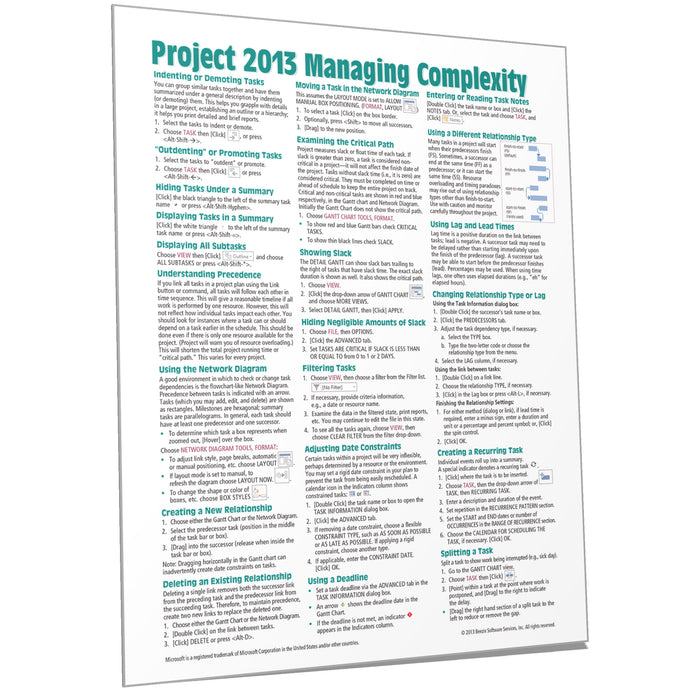
Project 2013 Managing Complexity Quick Reference
Original price
$3.60
-
Original price
$3.60
Original price
$3.60
$3.60
-
$3.60
Current price
$3.60
ISBN: 978-1-936220-93-9
Quantity Discount
We offer quantity discounts at 50, 100, and 500+ .
Please email: orders@beezix.com
Laminated quick reference guide showing step-by-step instructions and shortcuts for how to use Microsoft Office Project 2013 at the intermediate level. See also our related guide: Project 2013 Creating a Basic Project.
The following topics are covered:
Indenting or Demoting Tasks, "Outdenting" or Promoting Tasks, Hiding/Displaying Tasks under a Summary, Understanding Precedence, Using the Network Diagram, Creating/Deleting Relationships, Moving a Task in the Network Diagram, Examining the Critical Path, Showing Slack, Hiding Negligible Amounts of Slack.
Filtering Tasks, Adjusting Date Constraints, Using a Deadline, Entering or Reading Task Notes.
Using a Different Relationship Type, Lag & Lead Time, Changing Relationship Type or Lag, Recurring Tasks, Splitting Tasks
Adding Resources on the Fly, Noting a Resource's Vacation or Special Hours, Noting a Resource's Variant Rate, Getting a Task Done Faster.
Changing Calculation of Task Values, Permitting Overtime, Booking Additional Resources to a Task, Using Effort-Driven Scheduling, Adjusting when a Resource Works, Checking Resource Usage, Determining Resource Load, Leveling Resources Quickly, Viewing Different Field Collections.
Showing or Deleting a Progress Line, Monitoring Progress, Accessing a Subproject File, Communicating Plans and Progress.
The following topics are covered:
Indenting or Demoting Tasks, "Outdenting" or Promoting Tasks, Hiding/Displaying Tasks under a Summary, Understanding Precedence, Using the Network Diagram, Creating/Deleting Relationships, Moving a Task in the Network Diagram, Examining the Critical Path, Showing Slack, Hiding Negligible Amounts of Slack.
Filtering Tasks, Adjusting Date Constraints, Using a Deadline, Entering or Reading Task Notes.
Using a Different Relationship Type, Lag & Lead Time, Changing Relationship Type or Lag, Recurring Tasks, Splitting Tasks
Adding Resources on the Fly, Noting a Resource's Vacation or Special Hours, Noting a Resource's Variant Rate, Getting a Task Done Faster.
Changing Calculation of Task Values, Permitting Overtime, Booking Additional Resources to a Task, Using Effort-Driven Scheduling, Adjusting when a Resource Works, Checking Resource Usage, Determining Resource Load, Leveling Resources Quickly, Viewing Different Field Collections.
Showing or Deleting a Progress Line, Monitoring Progress, Accessing a Subproject File, Communicating Plans and Progress.
